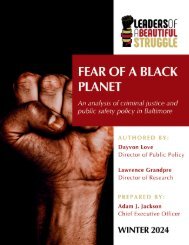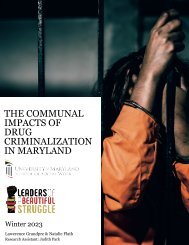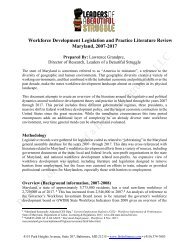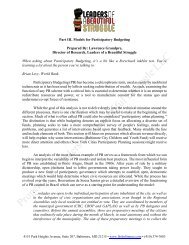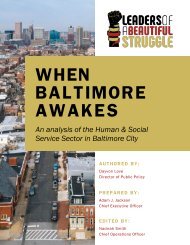Drug Decriminalization in Maryland Through an African Centered Research Paradigm- Analysis and Recommendations
This document offers guidance for theorizing questions related to a proposed research project purposed to advance drug decriminalization in Maryland.
This document offers guidance for theorizing questions related to a proposed research project purposed to advance drug decriminalization in Maryland.
- No tags were found...
Create successful ePaper yourself
Turn your PDF publications into a flip-book with our unique Google optimized e-Paper software.
coherent <strong>an</strong>d systematic theory is <strong>in</strong> place, then one elaboration may be to raise questions<br />
that may require empirical <strong>an</strong>swers. The empirical question is neither necessary nor<br />
sufficient as evidence for the validity of theory. Consider<strong>in</strong>g the conspicuous absence of<br />
<strong>in</strong>trospection <strong>an</strong>d self-study with<strong>in</strong> the context of the appropriate worldview for Afric<strong>an</strong><br />
people, then it would seem that empirical questions would be premature <strong>in</strong> the absence of<br />
theoretical base from which to generate such questions.<br />
Curtis B<strong>an</strong>ks (1980) has identified "deconstructive" or falsification research as <strong>an</strong>other<br />
type of research. Such research is concerned with <strong>an</strong> <strong>an</strong>alysis of the construct validity of<br />
traditional research. The falsification researcher is concerned with demonstrat<strong>in</strong>g the<br />
fallacy of the <strong>in</strong>ferences <strong>an</strong>d the methodological distortions of that traditional research.<br />
This is a process beg<strong>in</strong>n<strong>in</strong>g to undo the k<strong>in</strong>ds of destructive <strong>in</strong>ferences about Afric<strong>an</strong><br />
Americ<strong>an</strong>s such as we have described above that em<strong>an</strong>ated from traditional research.<br />
Falsification research <strong>in</strong>volves both theoretical dism<strong>an</strong>tl<strong>in</strong>g as well as empirical rebuttal.<br />
Ethnographic research is probably the only authentic form of empirical research that is<br />
appropriate for this po<strong>in</strong>t <strong>in</strong> our scientific method of development. This approach permits<br />
the researcher, hav<strong>in</strong>g passed the “Relationship [<strong>Research</strong>] Index” (Sow<strong>an</strong>de, 1971) to<br />
observe black people where they are <strong>an</strong>d to try fulfill<strong>in</strong>g the criteria of a worker with<strong>in</strong> the<br />
Afric<strong>an</strong> paradigm who c<strong>an</strong> beg<strong>in</strong> to identify those characteristics of Black people that are<br />
most fruitful <strong>in</strong> the light of our research model. Rather th<strong>an</strong> catalog<strong>in</strong>g deficiencies of<br />
Black people, the ethnographer researcher c<strong>an</strong> identify those strengths <strong>an</strong>d self affirmative<br />
patterns that have facilitated our growth.<br />
F<strong>in</strong>ally, heuristic research offers the bridge to our discussion of modalities. This research<br />
follows from the ethnographic research <strong>in</strong> that it beg<strong>in</strong>s to articulate culturally adaptive<br />
styles <strong>an</strong>d beg<strong>in</strong>s to demonstrate the benefits, which come from adapt<strong>in</strong>g that style. The<br />
objective of this research is to fortify those structures that have been demonstrated to be<br />
beneficial to the survival <strong>an</strong>d adv<strong>an</strong>cement of Black people. If tests are to be used, what<br />
k<strong>in</strong>ds of tests would be most appropriate <strong>in</strong> identify<strong>in</strong>g those qualities that have emerged<br />
as valuable <strong>an</strong>d effective for survival from the ethnographic research. (Akbar, 2003).<br />
While named the “Afric<strong>an</strong> Americ<strong>an</strong>” research paradigm by Akbar, this 4 part methodology is a<br />
good start<strong>in</strong>g po<strong>in</strong>t for <strong>an</strong> em<strong>an</strong>cipatory research methodology for <strong>in</strong>dividuals of <strong>an</strong>y race.<br />
Theoretical research does not take <strong>in</strong>to account the exist<strong>in</strong>g research <strong>in</strong> the field. In contrast,<br />
deconstruction research attempts to question the underly<strong>in</strong>g assumptions beh<strong>in</strong>d exist<strong>in</strong>g research,<br />
with <strong>an</strong> underst<strong>an</strong>d<strong>in</strong>g that <strong>in</strong> a society structured by racism/white supremacy, no research c<strong>an</strong><br />
extricate itself from reflect<strong>in</strong>g the cultural bias of the researchers <strong>an</strong>d is used <strong>in</strong> some way,<br />
accord<strong>in</strong>g to Ani, as a tool to help strengthen the exist<strong>in</strong>g system of power. Ethnographic research<br />
4151 Park Heights Avenue, Suite 207, Baltimore, MD 21215 • www.lbsbaltimore.com • (410) 374-7683




